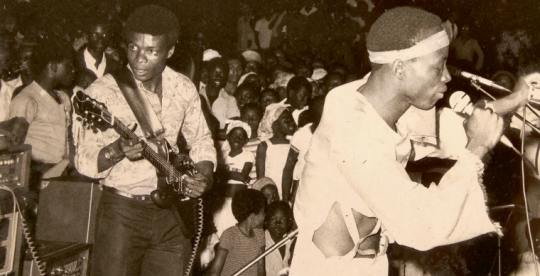|
In the ever-expanding reissue campaign scouring Africa’s 1970s golden age, attention has increasingly turned to the island nations considered part of the continent. We’ve heard cosmic disco from Cape Verde, stuttering Sega from Mauritius, Maloya from Réunion, the Rhumba-meets Taraab gumbo found in Zanzibar, and an indescribable smorgasbord of styles from Madagascar. So, it’s not surprising the Bongo Joe label would finally bring us an infectious collection of post-colonial grooves from the former Portuguese islands Sao Tomé and Principe, 240 or so kilometers off the coast of Gabon.
And like most the places referenced above, these two sister islands were first founded and inhabited by all manner of European explorers, traders, bandits, and risky entrepreneurs late 15th and early 16th centuries, with slave labor brought in from the African mainland an inevitable outcome due to rich soil perfect for growing sugar cane. However, alongside the ugliness of that endeavor came music, in this case rhythms connected to other Portuguese colonies such as Angola, Mozambique, and Brazil. Independence finally arrived in 1975, but big dance bands had been active for over a decade prior, rooting their music in earlier theatrical and dance ensembles.

|
|
The tracks here focus on bands such as Africa Negra, Sangazuza, Sum Alvarinho and others who share with Congolese Rhumba and Haitian Kampas (both of which are influences) a tendency to drive the music with a combination of multiple electric guitars weaving in and out of each other atop infectious rhythms impossible not to dance to. These sounds, known as Puxa, can also find natural common ground with South American Candombe and Macumba. The record industry, such as it was, released very little, and bands often recorded in a house in Sao Tomé city overlooking the ocean. Yet, based on what’s here, one might assume recordings thrived.
This collection’s consistency doesn’t really allow for highlights. Instead, the listener gets 16 tracks- recorded by 10 different bands- of relentless, guitar-and-percussion driven mania guaranteed to move hips. It works as a fantastic way to hear a connection between Portuguese speaking hunks of the African diaspora and their connection to styles found in the former-Portuguese African mainland. Rich in soil and rainfall, but horribly impoverished in many other ways, including extremely high unemployment, this music gives the impression, at least in the earlier days of independence, that these islands reveled in celebratory, ecstatic dance.- Bruce Miller
|
